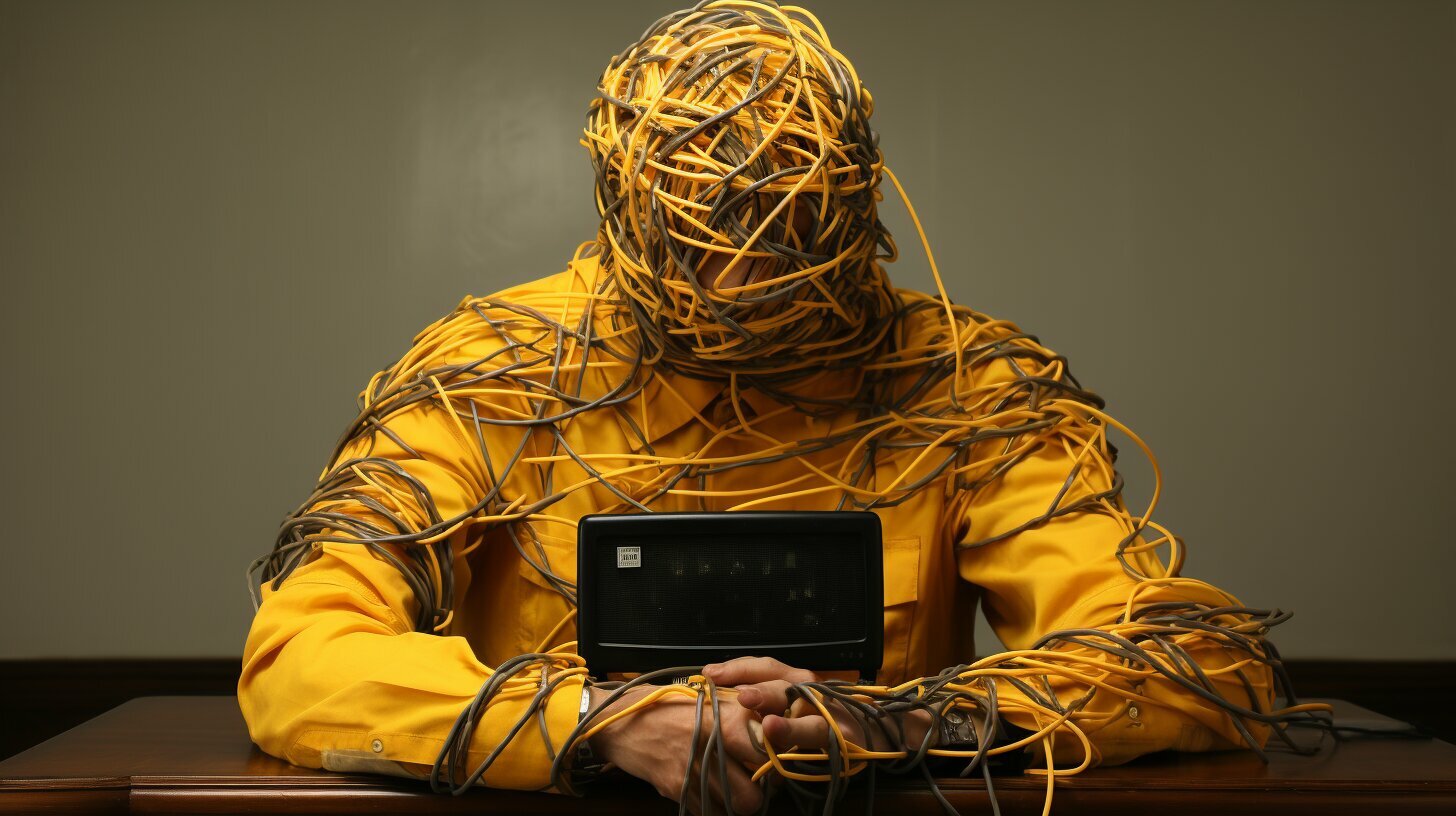As a copywriting journalist, I’ve come across many homeowners who have a stash of old electrical cords tucked away in a drawer or closet. While these cords may have been useful at one point, they eventually become outdated or no longer serve a purpose. The question then becomes, what should you do with them?
In this article, I will provide various solutions and tips to help you deal with old electrical cords. From repurposing to recycling, donating to upcycling, and more, you’ll learn about the many eco-friendly options available to you.
Key Takeaways:
- Old electrical cords can be repurposed, recycled, donated, upcycled, sold, or safely disposed of.
- Safety should be a top priority when handling old electrical cords.
- Proper cord management habits can prevent future clutter and disposal issues.
Repurposing Old Electrical Cords: Creative Uses and Ideas
If you’re hesitant to part with your old electrical cords, why not give them a new purpose? There are many creative ways to repurpose old cords without adding to your clutter. Here are some ideas to get you started:
DIY Crafts
Transform your old cords into DIY crafts for your home or office. Use them to create a colorful and unique wall art piece, like a woven tapestry or macrame wall hanging. You can also make practical items, such as a coaster or a rug. For a fun DIY project, try making a cord bowl by wrapping the cord around itself and securing it with glue, creating a useful decorative piece that can store small items.
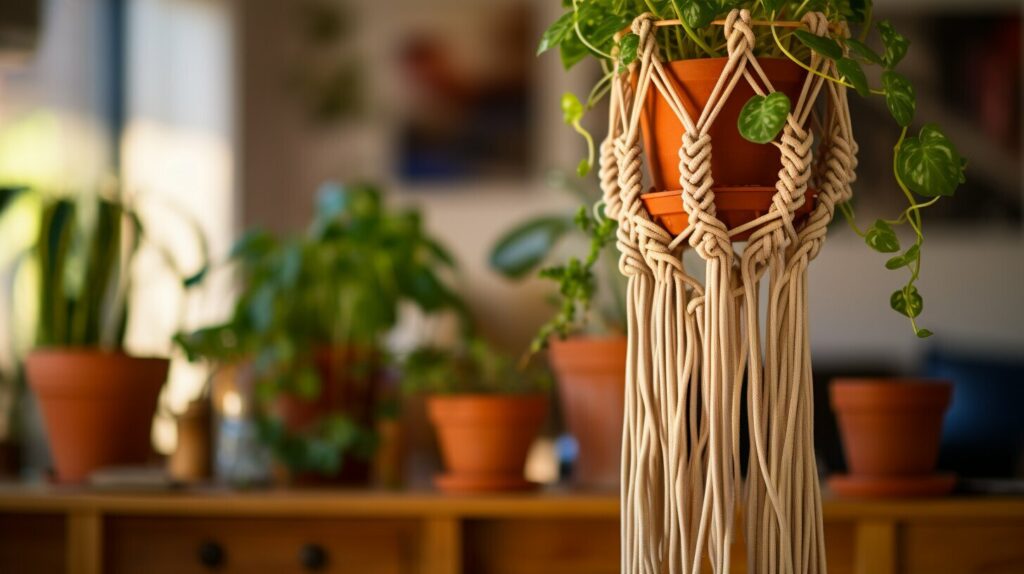
Organizing Cables
Organize your electronic cables with repurposed electrical cords. Use old cords to tie up cables and keep them neat and tidy. You can also create a designated space for electronic cables by attaching them to the back of your desk or entertainment center with repurposed cords, helping to reduce clutter and tangled wires.
Creating Decorative Items
Old electrical cords can be used to create unique decorative items for your home or office. You can weave a colorful cord basket or make a statement pendant light fixture. Try adding an unexpected pop of color to your space by wrapping cords around a lamp base or creating a macrame plant hanger.
Repurposing for Fashion
Old electrical cords can also be used to create fashionable accessories. Use them as the base for a statement necklace or bracelet, or try wrapping cords around a hair accessory or purse strap. The possibilities are endless!
Recycling Old Electrical Cords: Eco-Friendly Options
Reducing electronic waste is crucial to preserving the environment, and recycling old electrical cords is a simple yet effective way to make a difference. When cords are disposed of improperly, they can release hazardous chemicals that can harm wildlife and pollute the air and water.
If you have old cords that you don’t need anymore, consider recycling them instead of throwing them away. Many recycling centers and electronic waste programs accept cords, and some even offer pickup services.
| Accepted Materials: | Most cords, wires, and cables made of metal or plastic |
|---|---|
| Not Accepted Materials: | Extension cords with exposed wires, cords that are frayed or broken, cords with liquid inside, cords with sharp or hazardous components |
Before recycling your cords, it is important to prepare them properly. Remove any batteries, tape, or plastic components, and separate metal and plastic items. Consider bundling cords together with zip ties or twist ties to make them easier to handle.
By recycling your old electrical cords, you can help reduce electronic waste and protect the environment for future generations. Remember to always prioritize responsible disposal.
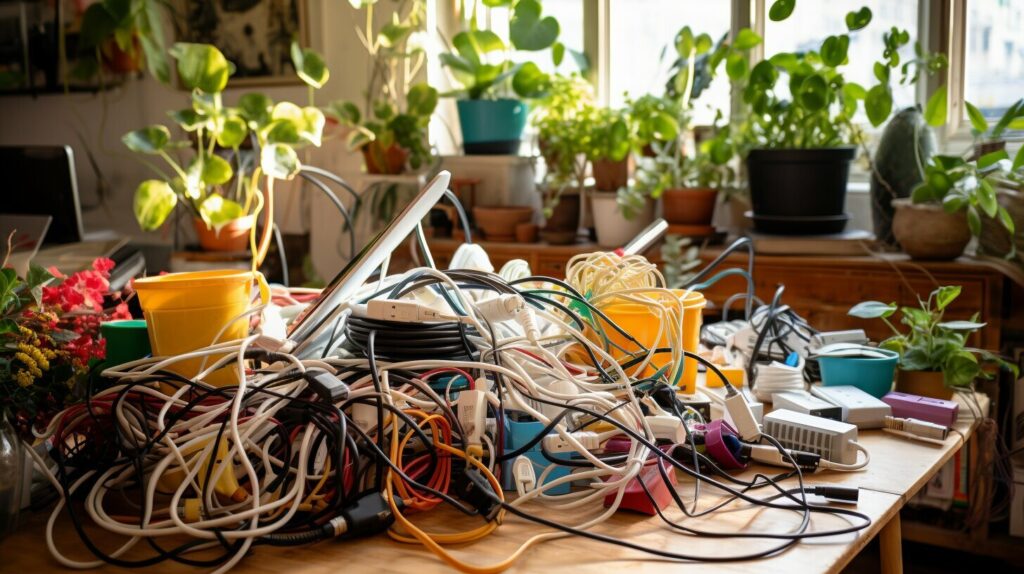
Donating Old Electrical Cords: Organizations and Charities
If you have old electrical cords that still have some life left in them, consider donating them to organizations or charities that can put them to good use. Many community centers, schools, and nonprofits are always in need of cords for computer labs, workshops, and other activities. By donating your cords, you are not only keeping them out of landfills but also helping others who may not have access to this equipment.
Before donating, make sure the cords are in good working condition and free of any damage. Check with the organization or charity beforehand to ensure they accept cord donations and find out any specific requirements for the cords.
Some great options for cord donations include local schools, libraries, and community centers. You can also search for national organizations, such as Computers with Causes or the National Cristina Foundation, that accept cord donations for educational or charitable purposes. By donating your cords, you can make a positive impact on those in need and contribute to a more sustainable future.
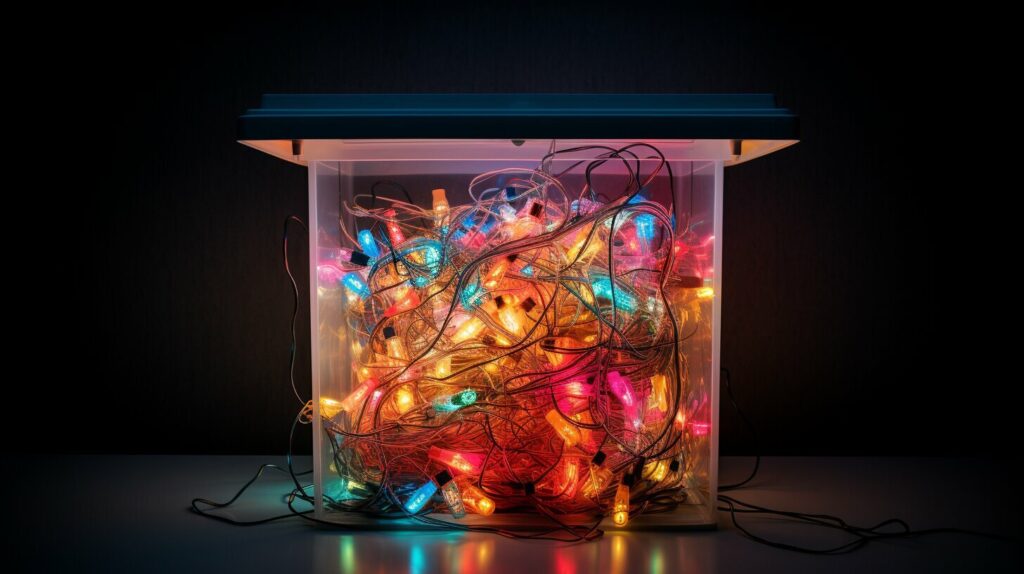
Note: Always consult with the organization or charity beforehand to ensure they accept cord donations and find out any specific requirements for the cords.
Safely Disposing of Old Electrical Cords: Proper Methods
If you have old electrical cords that you can no longer use or repurpose, it’s important to dispose of them properly to avoid any harm to the environment. It’s never a good idea to simply throw them in the trash or burn them. Here are some safe and eco-friendly methods for disposing of old electrical cords:
Recycling
Recycling is one of the best ways to dispose of old electrical cords. Many cities have electronic recycling programs that take cables and wires. You can also check with local recycling centers or community organizations to see if they accept electronic waste. Before recycling, make sure you remove any plugs or connectors, and if possible, separate the cords by type of material to increase the recycling efficiency.
Hazardous Waste Disposal
If your electrical cords contain hazardous materials, such as lead or mercury, it’s essential to dispose of them properly to avoid polluting the environment. Check with your local waste management facility or government office to find out how to safely dispose of hazardous waste in your area.
Donations
Consider donating your old electrical cords to organizations or charities that may have a need for them. Local schools or community centers that offer tech classes or workshops, for example, may appreciate cord donations. Before donating, make sure the cords are still in good condition and function properly.
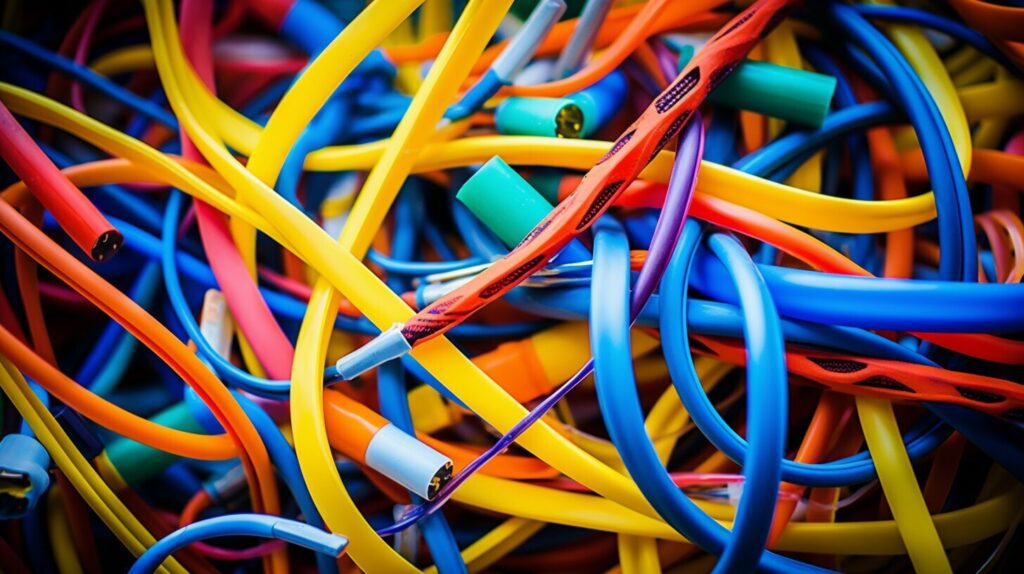
Manufacturer Take-Back Programs
Many electronics manufacturers have take-back programs where they accept old electrical cords and other electronic accessories for recycling or proper disposal. Check with the manufacturer of your device to see if they have a take-back program or provide any instructions for disposing of old cords.
By responsibly disposing of your old electrical cords, you can help protect the environment and prevent potential hazards. Remember to always prioritize safety when handling cords, and consider the eco-friendly options available to you.
Upcycling Old Electrical Cords: Innovative Design Ideas
If you’re feeling crafty, consider upcycling your old electrical cords into something new and stylish. Not only will you be reducing waste, but you’ll also have a unique item that adds a personal touch to your home or wardrobe.
One option is to create jewelry using the colorful wires. Cut the cords into small pieces and string them together to make bracelets or necklaces. You can even add beads or charms to customize your accessories.
Another idea is to use the cords to make home decor, such as a lampshade or wall hanging. Try braiding the cords together or weaving them into a pattern for a unique texture.
If you’re into fashion, consider using old electrical cords to embellish clothing or accessories. Use pliers to shape the cords into letters or shapes, and then glue or sew them onto a hat or bag.
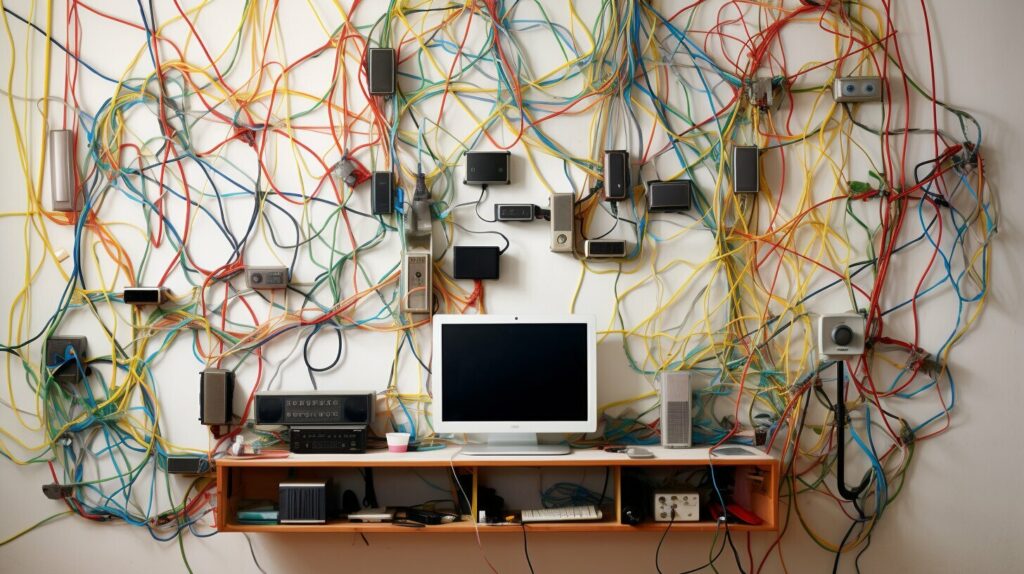
For more upcycling inspiration, check out online tutorials or DIY blogs. Upcycling old electrical cords is not only a fun and creative activity, but it also promotes sustainability and environmentalism.
Safety Precautions: Handling Old Electrical Cords
When dealing with old electrical cords, safety should always be a top priority. It’s important to take proper precautions to avoid any accidents or injuries. Here are some tips to keep in mind:
- Always unplug cords before handling them. This will prevent any potential electrical shocks.
- Store cords properly. Avoid wrapping them tightly around objects or leaving them out in the open where they can be tripped over or damaged.
- Check for any damage or fraying. If a cord looks worn or damaged, it’s best to replace it rather than risk a potential hazard.
Remember, taking these precautions can help ensure the safety of yourself and those around you.
If you’re unsure about the safety of a particular cord, it’s always best to err on the side of caution and seek professional advice.
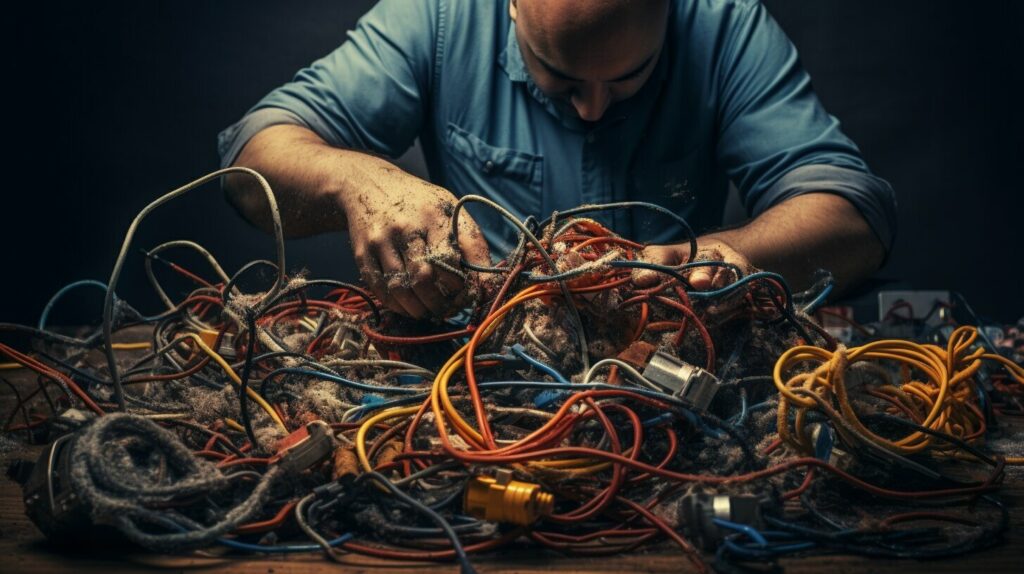
Organizing Old Electrical Cords: Tips for Taming the Tangle
If you have a collection of old electrical cords, you know that they can quickly become tangled and overwhelming to manage. However, with a few simple organization tips, you can keep those cords neat and tidy.
Label your cords: One of the easiest ways to keep cords organized is by labeling them. Use small stickers or label makers to add identifying information, such as the device the cord belongs to or the date it was purchased. This way, you can easily locate the cord you need without having to dig through a pile of tangled wires.
Use cable organizers: Cable organizers are a great tool for keeping cords in order. You can use a velcro or zip-tie to hold the cords together and prevent them from getting tangled. For a more DIY approach, try using binder clips or bread ties to keep cords neat and organized.
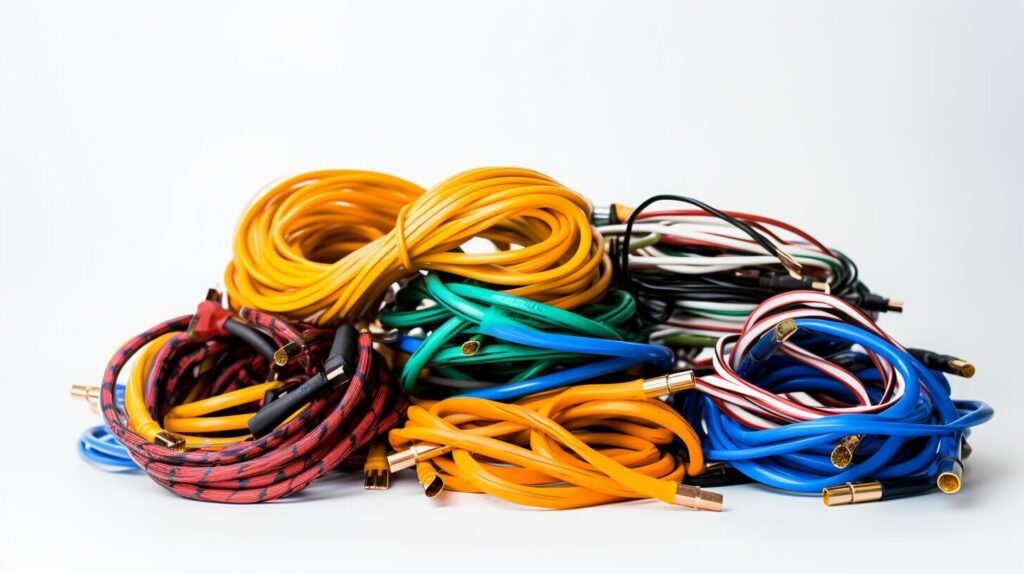
Create a dedicated storage space: Designate a specific area for cord storage to help keep them from getting mixed up with other items. This can be a drawer, cabinet, or even a storage bin. Be sure to keep the area clean and organized so that cords are easy to find when you need them.
Get rid of cords you no longer need: One of the easiest ways to manage electrical cords is by getting rid of the ones you no longer need. Dispose of them properly or consider donating them to a local charity or organization.
With these simple tips, you can turn a tangle of electrical cords into a neat and organized collection.
DIY Cord Repair: When to Fix or Replace
If you’re like me, you probably have a few old electrical cords lying around that could use some attention. But when it comes to cord repair, it can be tricky to know when to fix or replace them. Here are some tips to help you decide.
First, look for any visible damage to the cord, such as fraying or exposed wires. If you spot any, it’s best to replace the cord entirely. These types of damage can be dangerous and increase the risk of electrical shock or fire.
However, if the cord is in good shape but not working correctly, there may be a simpler fix. Check the plug for any bent prongs or loose connections. If you find any issues, you can often replace the plug rather than the entire cord.
For more complex problems, it’s best to consult a professional electrician. They can diagnose the issue and determine if it’s safe and feasible to repair the cord.
Remember to always prioritize safety when handling electrical cords. Only attempt repairs if you feel confident in your abilities and have the necessary tools and materials.
By knowing when to repair or replace old electrical cords, you can extend the life of your cords and keep them in good working order.
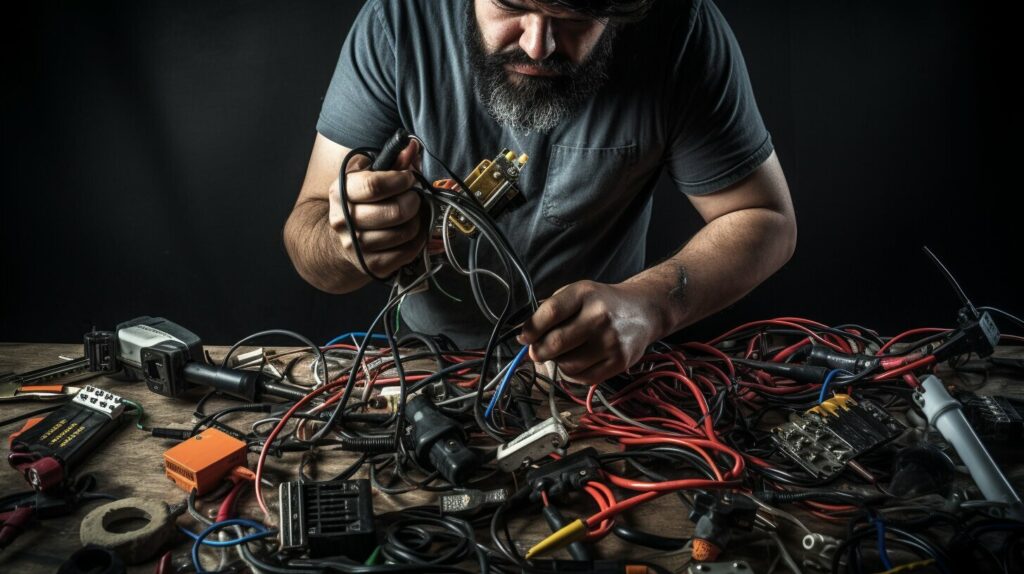
Selling Old Electrical Cords: Online Marketplaces and Options
If you have old electrical cords that are still in good condition and you’re looking to make some extra cash, selling them on online marketplaces is a great option. There are a variety of platforms available, each with their own features and benefits. Here are some popular options to consider:
| Platform | Description |
|---|---|
| eBay | One of the largest online marketplaces, eBay allows you to sell a wide range of items, including electrical cords. You can choose to sell your cords in an auction-style format or set a fixed price. |
| Facebook Marketplace | Facebook Marketplace is a free platform that allows you to sell items to others in your local area. You can set your own prices, negotiate with potential buyers, and arrange for local pickup or delivery. |
| Craigslist | Craigslist is another platform that allows you to sell items locally. It’s free to use, but you’ll need to post your listing in the appropriate category and arrange for pickup or delivery with the buyer. |
When selling your old electrical cords, make sure to provide clear descriptions and photos of the items. Be honest about any wear and tear, and price them competitively based on their condition and market value. It’s also important to factor in shipping costs and packaging materials if you’re selling on eBay or other platforms that require shipping.
Remember, selling your old electrical cords is not only a great way to make some extra money, but it’s also an eco-friendly option that helps keep these items out of landfills.
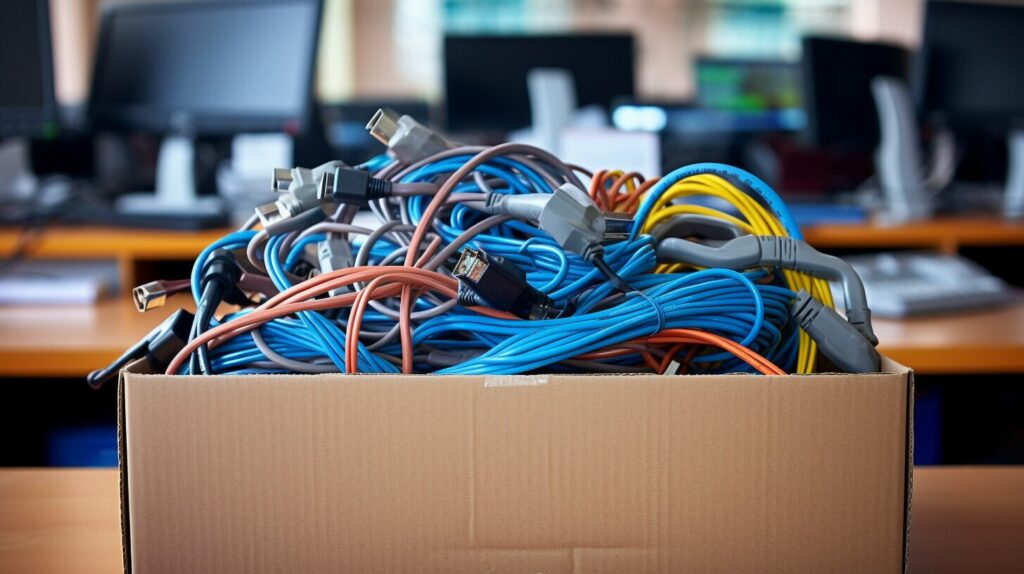
Image source: seowriting.ai
Responsible Cord Management: Tips for the Future
Now that you have learned about various ways to repurpose, recycle, donate, safely dispose, upcycle, organize, repair, and sell old electrical cords, it’s time to think about responsible cord management habits for the future.
First, labeling cords is critical for keeping them organized and easy to identify. Invest in cable organizers or create dedicated storage spaces for cords to prevent tangles and knots.
To reduce clutter and minimize waste, it’s important to purchase only the cords you need and make sure to maintain them regularly. Check cords regularly for signs of wear and tear, and replace them if necessary.
If you’re unsure about cord repair techniques, consult with a professional to ensure safe and effective repair of damaged cords. Remember to prioritize safety when handling electrical cords and always unplug devices before working on them.
By adopting these responsible cord management habits, you can prevent future clutter and disposal issues while also ensuring the safety of yourself and others.
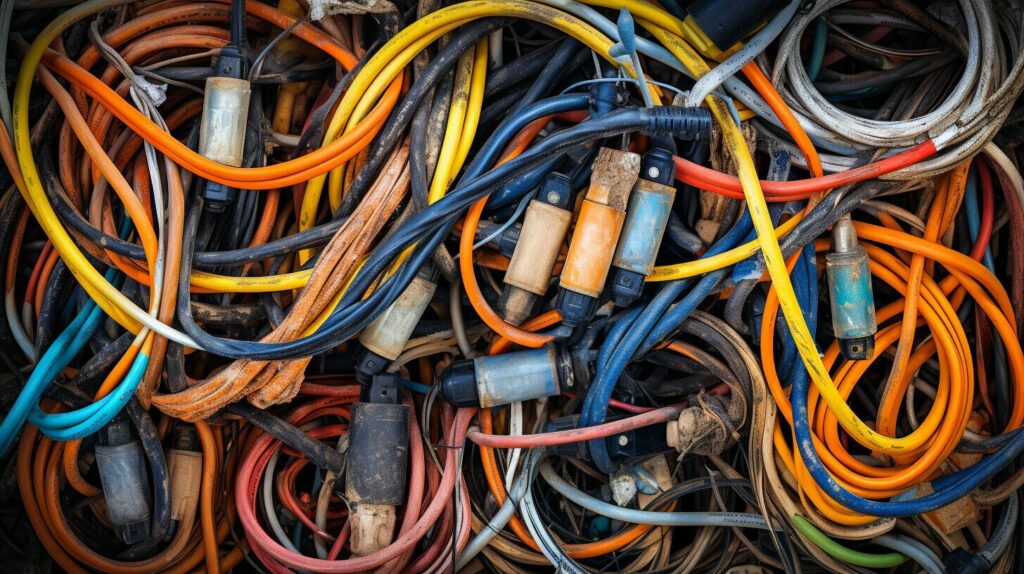
“To reduce clutter and minimize waste, it’s important to purchase only the cords you need and make sure to maintain them regularly.”
Remember, being mindful of the environmental impact of our cord management choices is essential. By making eco-friendly choices when dealing with old electrical cords, we can all contribute to a more sustainable future.
Conclusion
Managing old electrical cords can be a daunting task, but with the right information and tools, it can be a breeze. By repurposing, recycling, donating, or safely disposing of old cords, we can help the environment and declutter our homes.
Remember to prioritize safety when handling electrical cords, and consider upcycling them for unique and innovative designs. With proper organization and maintenance, we can prevent future clutter and waste.
Thank you for taking the time to learn about responsible cord management. Let’s take action and make a positive impact!

